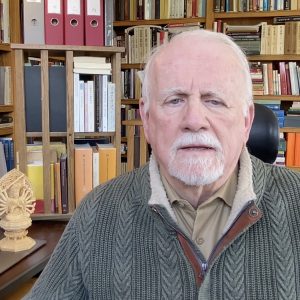
Wǔtáishān: Terrestrial Home of Mañjuśrī, Ancestor of All Buddhas
Ukiah, CA 95482
Robert M. Gimello studies E. Asian Buddhism, especially its medieval and early modern periods and its roots in Indian Mahāyāna. He focuses on Huáyán (The “Flower-Ornament” Tradition), Chán (Zen), and Mìjiāo (Esoterism), especially the relationships between doctrine and contemplative and liturgical practice.
Dr. Gimello is interested also in Theology of Religions, Comparative Mysticism, and Visual Religious Culture. He has published extensively in these areas, and his annotated translation of the inaugural text of the Hwaŏm (Korean Huáyán) tradition is due out later this year. He has taught at Harvard, University of Arizona, and University of Notre Dame, among other institutions.
Abstract: A lecture surveying the place of Wǔtáishān in East Asian Buddhism, with emphasis on its chief denizen, Mañjuśrī. We will explore both the belief that Mañjuśrī resides in Northern China, on a magical but earthly mountain, and the belief that he is unique among bodhisttvas insofar as he is not simply a figure far advanced on the path to buddhahood, as is assumed of most bodhisattvas, but actually the progenitor of all buddhas. This status may help explain both his exalted identity in systems of doctrine like Huáyán, where he is understood to embody the perfection of wisdom (prajñā), and his magnetic role in the millennia-old practice of pilgrimage to Wǔtáishān from all over Asia. Both Mañjuśrī’s doctrinal significance and the practice of pilgrimage will be examined by treating selections from the lore concerning Wǔtái and its presiding deity.